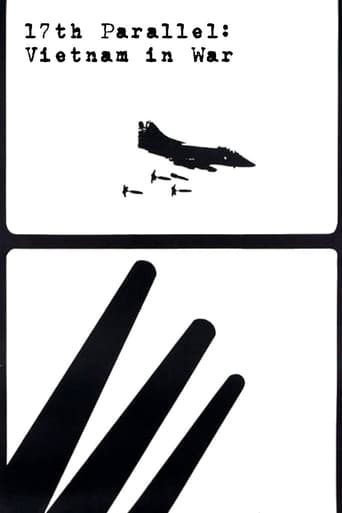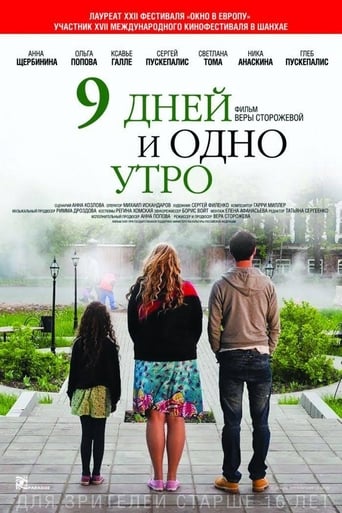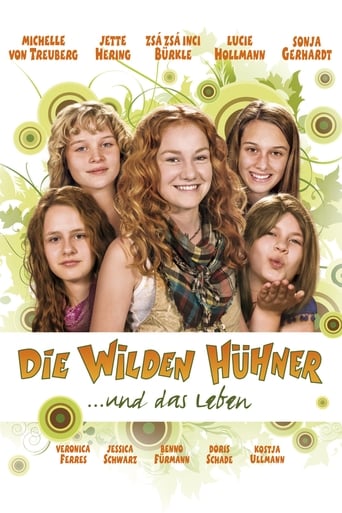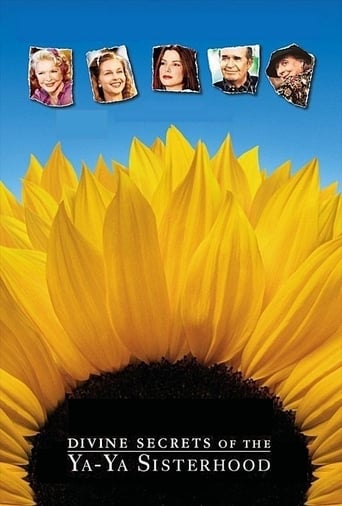

The 17th Parallel (1968)
On the border of North and South Vietnam, civilians live underground and cultivate their land in the dead of night, farmers take up arms, and bombs fall like clockwork. Joris Ivens and Marceline Loridan’s record of daily life in one of the most volatile regions of a war-torn, divided country is both a hazardous piece of first-hand journalism and a shattering work in its own right, simmering with barely repressed anger.
Watch Trailer
Cast
Similar titles



Reviews
Sadly Over-hyped
One of my all time favorites.
Fresh and Exciting
Very good movie overall, highly recommended. Most of the negative reviews don't have any merit and are all pollitically based. Give this movie a chance at least, and it might give you a different perspective.
In the first war scene of "The Deer Hunter" we see a North-Vietnamese soldier, who throws a handgrenade into a shelter filled with civilian villagers. Although such atrocities did undoubtedly occur, the scene clearly serves the purpose of propaganda. In fact, the resistance could obviously never have been so fierce, if North-Vietnam had acted like that on a large scale. The film "Apocalypse now" is already more objective: At the start we see the forcible deportation of villagers by the US Army, which was indeed a common practice at the time. Later when the special forces unit enters the enemy territory across the river, the US Army destroys a complete village and the fleeing villagers are attacked with napalm bombs. Still in this scene the film makers try to suggest that a more or less respectable war was made between two equal parties. I guess this is as far as criticism of the military policy with respect to Vietnam could go without mentally disrupting the public in the USA and without risking a government ban. The Ivens film Le 17eme parallele goes one step further, and tells the story from the perspective of the North-Vietnamese villagers, like those who were gunned down in Apocalypse Now. As an American it will probably be difficult to sit Le 17eme parallele out, since the message is so much opposed to the common notion on American television. Indeed the film is propaganda, but not more than the scene in The Deer Hunter. In Europe this work of Ivens was received with interest in wide circles of society. Here the Bolshevism has never caused a fear to the same extent as in the USA, but on the contrary remained attractive to many. We again see villagers along the Ben Hai river, who have flown from the deportations and destruction by the American bombardments, to the north side of the embankment. Here they are welcomed by the local authorities, who run the agriculture on a collective basis. During the whole film we hear shelling and passing planes. Whereas the US Army brings destruction (which is indeed their assignment), the North-Vietnamese council tries to reconstruct and facilitate the daily life under extremely poor and primitive conditions. They are indeed the sole source of indispensable provisions such as medical care and education in the area. They supply a subsistence minimum. A main problem is the enemy destruction of the crops on the fields. The peoples liberation army with its primitive weaponry tries to protect the farmers and villagers from enemy tank and bomber attacks. We see an occasional brought down bomber ("The pilot jumped with a parachute but was dead when he reached the ground"), and the remains of supposedly the pilot (similar to the scene in The Deer Hunter where we see the burning body of a North-Vietnamese soldier). The unexploded bombs are used to fabricate mines against helicopter raids. There is even a scene of the coast-guard shelling an American warship. The villagers are urged to form their own militia. The notorious trenches and underground galleries and shelters are indeed there, but they are mainly meant to store food (rice) and to protect against the bomb fragments. They are also used as combat posts, and the film portrays the unshakable belief in victory of the locals. Although the film is clearly subjective, I guess that Ivens did not intend to be the instrument of political propaganda. He just wanted to give voice to a perspective, that was (and largely is) unknown in the west. In fact the Bolshevist way of life and its dogmatism in the film does not seem very attractive to the western observer. The rhetoric of the interviewed party officials is indigestible and can only be watched with skepticism. And it must be said, that while this Ivens film is accessible through for instance IMDb.com (where it is clearly unpopular), I doubt that conversely The Deer Hunter is available in for instance Vietnam. There can be no doubt that in general life in the west is preferable (with the occasional exception of for instance some city ghettos). I do not rate this Ivens film on the same high scale as Ellende in de Borinage or The Spanish Earth. However, it is a courageous film that sends the message that imperialism and hegemony are a poor guarantee for justice to all.






